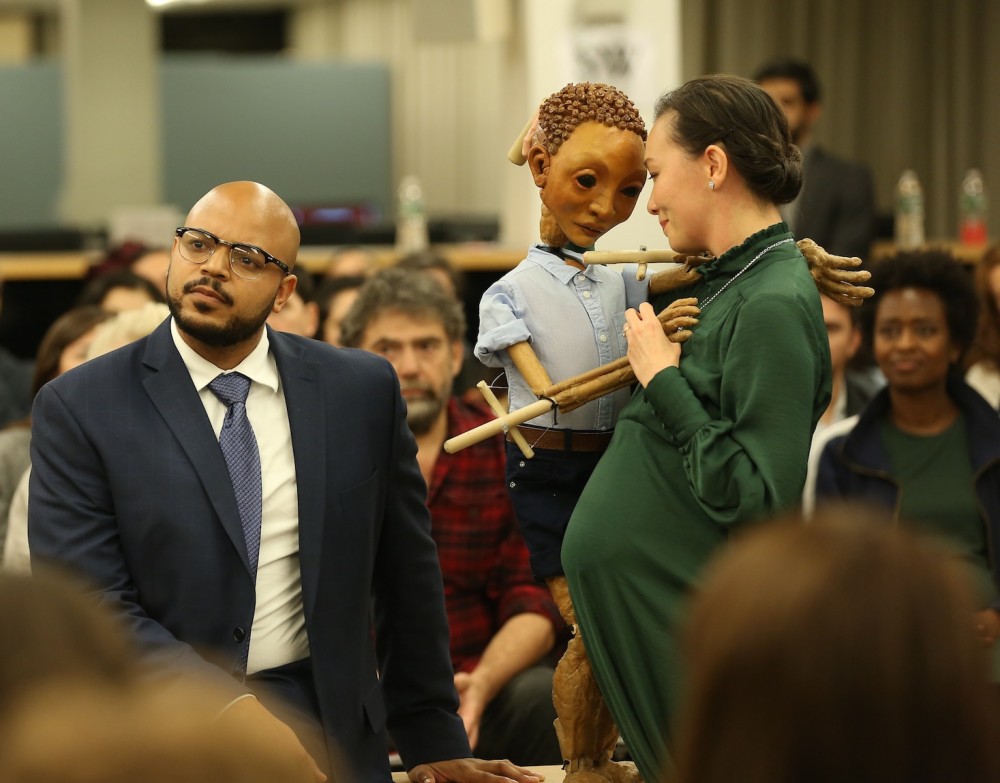
Stacey Yen, Chris Myers, Nina Grollman
by JK Clarke
At some point in a long list of accolades, the Public Theater’s Mobile Unit should be singled out for consistently turning out first rate, accessible—albeit stripped down—productions of William Shakespeare’s plays. Their latest offering, the complicated and often frustratingly meandering melodrama The Winter’s Tale, is yet another demonstration of their expertise. Following their seemingly insurmountably excellent Twelfth Night last spring, this Winter’s Tale is clear, sharp and precise. It’s a beautifully edited version of the play that allows its plot points to surface clearly for its touring audience, largely made up of people who’ve not only never been to a Shakespeare play, but have never seen live theater period.
In its productions back on home turf at the Public Theater, Stephanie Ybarra (who helms the Mobile Unit)traditionally introduces the play and the program to the audience, explaining its charter (in essence: bringing Shakespeare to the people) and discussing reactions from various audience members while the play was on the road. One Rikers inmate this year poetically described the production as “drawing a clear glass of water from a muddy well.” An apt simile, for both the production and the program itself.


Justin Cunningham, Nicholas Hoge
Though The Winter’s Tale, whose etymology in Elizabethan English suggests a happily ended story with an unrealistic plot, Mamillius, the doomed son of Leontes, King of Sicilia, points out that “a sad tale’s best for winter.” This play is both (though Mamillius’ portion is indeed sad). As written, the story is devastatingly tragic in the first act and absurdly joyous and optimistic in the second. But director Lee Sunday Evans has wisely (and necessarily, for time) excised some of the more superfluous sections of the second act, which already features an abundance of new characters. Gone, in particular, is the “comic” relief of Autolycus, a peddler/con man; while his speeches and songs are notable from a literary standpoint, they do little to add to the play’s clarity and much to add to its length. Consequently, the second act here functions to resolve the problems created by the first. Personally, I find it makes for a far more palatable play.
The chief themes of this production, then, become madness, jealousy and redemption. At the play’s opening Leontes (Justin Cunningham, whose calm and seeming benevolence belies a sociopathy in his character) suddenly accuses his wife Hermione (Stacey Yen, who embodies royal grace) of infidelity with his lifelong bosom buddy Polixenes (Nicholas Hoge), King of Bohemia (who’s prone to wearing bolo ties and cowboy boots with jeans, so you can maybe see why Leontes suspected him of something). In a fit of absolute madness he jails nine-months pregnant Hermione and hires an assassin to kill Polixenes.
But karma is swift. Polixenes escapes and not long after the Oracle from Delphi exonerates Hermione (a judgment foolishly rejected by Leontes); his son Mamillius (hauntingly acted by a puppet (gorgeously designed by James Ortiz) and handled by Chris Myers, who later plays Polixenes’ son Florizel) dies suddenly, as does Hermione; and shortly thereafter her newborn daughter is spirited away to a foreign land.


Justing Cunningham, Stacey Yen
That foreign land is, conveniently, Bohemia, and the nobleman who brings the princess, Perdita (Ayana Workman) there is conveniently dispatched in Shakespeare’s most famous stage direction: Exit, Pursued By a Bear. Said bear, a large and dramatic likeness, is rendered by a multi-personed puppet, some for hands, legs and a last for the grizzly head. Fast forward sixteen years and lo and behold Perdita, who has been raised by bumbling but kindly shepherds, has met and fallen in love with Florizel (just in case you had any doubt that royal lineage was pre-ordained). But it’s a forbidden love because his father the king has no idea she’s anything but a peasant. So they elope to . . . Sicilia. Conveniently, sixteen years after his temporary, and apparently non-recurring bout with madness, Polixenes is living an almost monastic life of remorse. But Hermione’s lady-in-waiting, Paulina (Patrena Murray), has a surprise in store for the king. Turns out fate has one in store for her, too, and the kids (notably the “lost” princess) show up with the Bohemian king hot on their tail. Everything all comes together for a lot of hugs, “sorrys” and a whopper of a scarcely believable surprise at the end. How this play wasn’t called “All’s Well That Ends Well” can only be because there was already one with that name.
The Winter’s Tale may not be one Shakespeare’s greatest works, but for many it is a favorite. Such a high arc of melodrama has its appeal; and Evans, along with the cast, make it even more compelling. With short, choreographed songs linking scenes (such as the poignant, “There’s some ill planet that reigns . . .”) the mood and drama are effectively heightened so that when the tension finally breaks the relief is palpable. It’s likely the surprise ending will moisten a few cheeks with a happy tear or two, as well. It’s just another sign that the Mobile Unit has once again brought Shakespeare to a new and appreciative audience, some of whom may be forever altered by the experience. And that’s as happy an ending as one can hope for.
The Winter’s Tale. Through December 17 at the Public Theater (425 Lafayette, at Astor Place, Greenwich Village).100 minutes, no intermisison. www.publictheater.org
Photos: Carol Rosegg






















